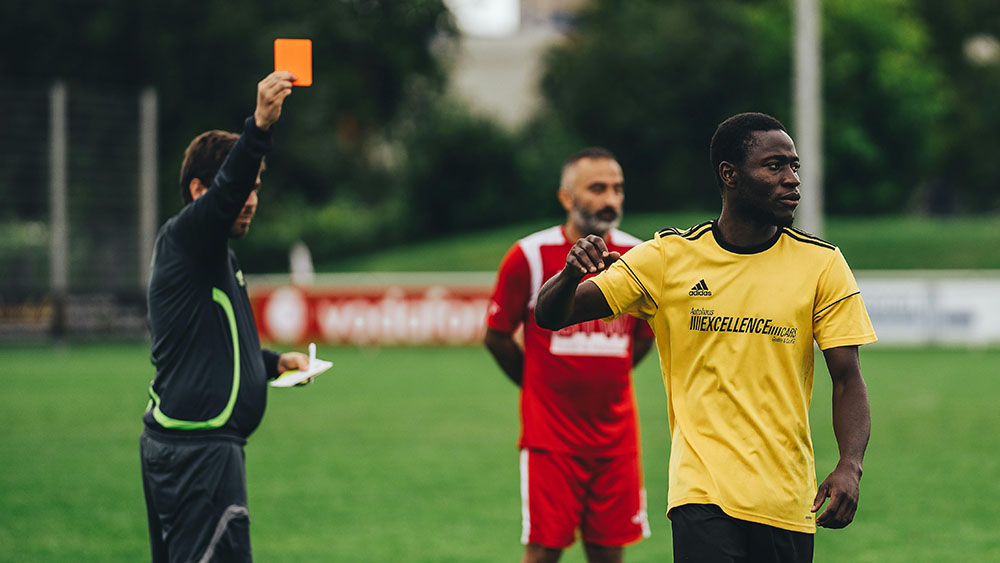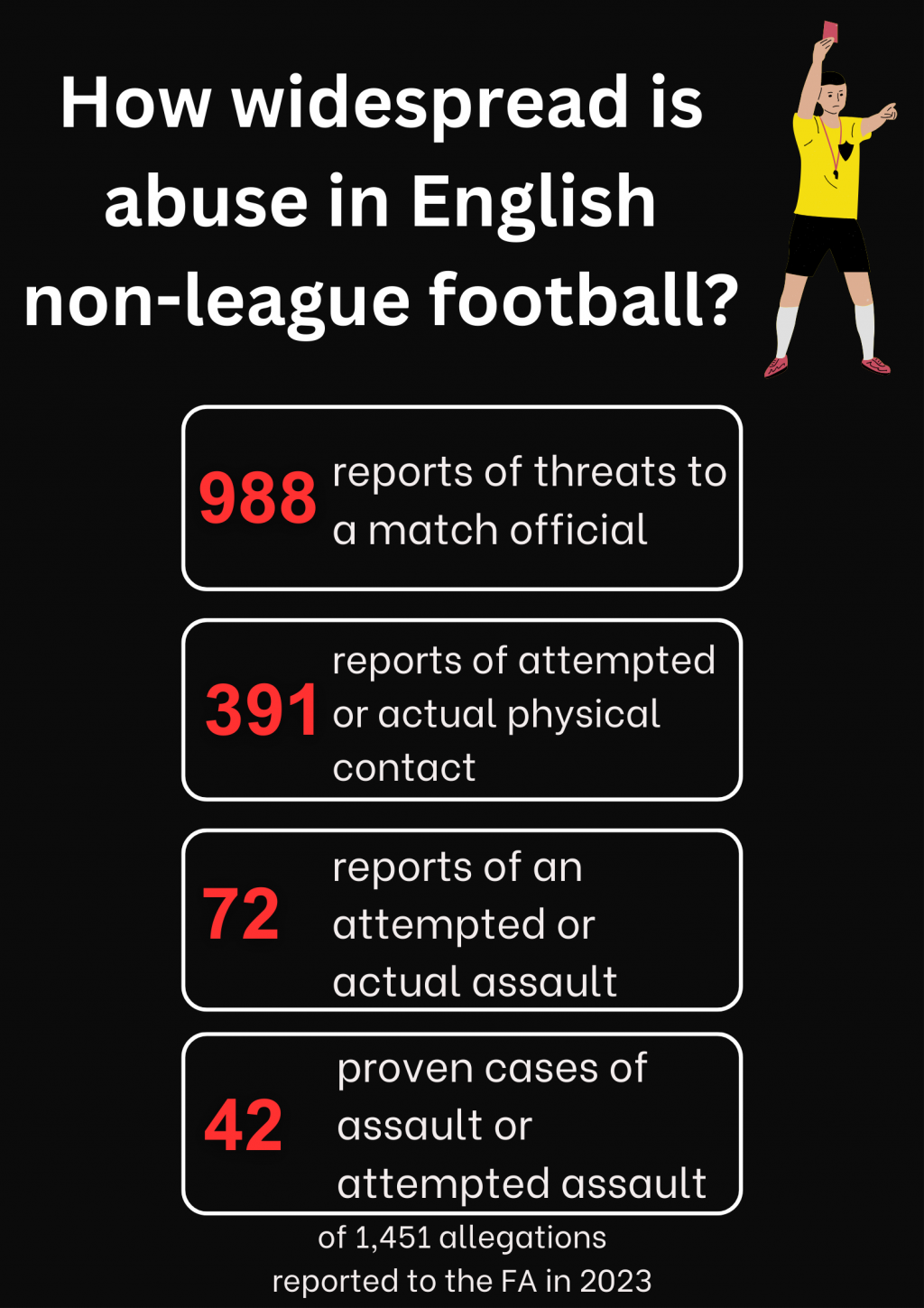Referees are abandoning grassroots football in Wales in the face of growing verbal and physical abuse. Is football no longer ‘the beautiful game’?

Referees are seldom appreciated in professional football. It’s difficult enough applying the law and working with with whoever is wearing the captain’s armband. The pressure only increases when they are swarmed by reinforcements pleading their case after the latest foul.
Then you have the managers and backroom staff roaring from the bench. A stadium full of fans rattles off the time-honoured chant that ‘you don’t know what you’re doing,’ or just a blunt expletive will do.
And yet, for those officiating far from the stadia of the Premier League, in the grassroots leagues, that level of abuse would already be shocking.
It would be beyond belief to find out this happened to a 15-year-old referee.
“Look at the level of football you’re playing, it’s only under-14s football. It’s not life and death, it’s not the World Cup final, it’s a game of football for kids. So no matter how frustrated or annoyed that you are, you just don’t go around abusing other people in that way.” said Amin Said, a Tier 3 referee and secretary of the Cardiff Referees’ Society.
While the society is reviewing the incident, details of the match haven’t been released in full due to the age of the referee involved.
But a recent Twitter post revealed that verbal abuse came from players, parents, and the manager of one of the under-14 teams involved.
Even though this was just a glimpse into grassroots referee abuse, the tweet has been seen almost 140,000 times since it was posted on the 4th February, 2024.
“Normally when we when we do post tweets, we get about on average 2000 or 3000 views. I think we have to be a little bit careful, because if the story blows up then people are going to say ‘Well, I’m not letting my son or daughter referee’ and put a negative on that perspective,” said Amin.
The timing could not be more urgent.
A report from the Football Association of Wales in August 2023 laid bare just how prevalent referee abuse is – out of 282 respondents, 88% said they have received verbal abuse and 1 in 4 have received physical abuse in their time as referees.
More than half also say that behaviour at fixtures is worsening, to the point that the FAW admits they can no longer provide an official at every Welsh grassroots game due to a shortage in referees.
Referee abuse isn’t just a uniquely Welsh problem, however. The English FA recently released a groundbreaking report, the Annual Grassroots Disciplinary Review, which catalogued almost 1,500 cases of referee abuse.

Football culture has been under growing scrutiny as footballing authorities have planned to tackle the problem. Many believe that a lack of respect in the professional game filters all the way down the football pyramid to non-league.
The Premier League instructed last season that it would be clamping down on dissent, which led to bookings trebling from 24 to 80.
One of the worst incidents took place in Turkey last year, where Turkish referee Halil Umut Meler suffered a fracture when he was punched by the club president of MKE Ankaragücü, who charged onto the pitch after his side conceded a late equaliser.
It’s impossible to know what truly influences the prevalence of abuse in non-league football. Some point to a tendency to dehumanise referees, viewed as just a means to officiate a game and enforce laws. Although it’s difficult to envisage how anyone could be a good referee without also having the emotional intelligence needed to stop 22 men from kicking lumps out of each other across the entire pitch.
But for those on the ground like Amin, abuse has persisted throughout football’s culture and history.
“I think that it’s always been there. This is football’s nasty secret. Lawmakers are trying to get a grip on it, but it’s so ingrained and part of the culture that it’s so difficult to get to get at that level of control at all levels of the sport.”
Tackling abuse, then, is twofold. Nobody can expect football culture as a whole to mature overnight, but one thing that has already been changing is how football authorities are better protecting their referees and encouraging them to stay.
The FAW has invested heavily into referee training and created the post of a recruitment and retention manager to help keep newly qualified referees in the game, something that Amin knows is still a hurdle.
“Referees now do a 20-hour online course to start off with, but I think some referees don’t get that that sense of camaraderie that older generations of referees have. There’s more to refereeing than just the training, there’s experienced officials that are there to help with advice and tips to get you on the right pathway,” said Amin. “But out of a large number of people completing the course, you’ll find the ones who will become dedicated referees.”

Then there is football’s latest, and certainly most divisive, measure – the blue card.
The blue card works like a ‘sin bin’ in rugby – when a player is sent to the technical area for a 10 minute penalty for a given infraction, including dissent.
The Premier League has balked at the offer of a trial period to test its effectiveness. It’s telling that, at the other end of the pyramid, trials have been implemented across several leagues in Welsh non-league.
“I fell into my first blue card a couple of weeks ago. I had to book someone for a caution over a challenge, then had to go back to someone screaming their head off. I just said ‘Alright, there’s no yellow card for you but this time it’s a sin bin, off you go for 10 minutes’ and the guy stood there thinking ‘Oh, where do I go?’ It was the first time it happened to him so it was all very new for everyone,” said Amin.
Teams are adapting quickly. Early data from the FAW suggests that once a player is sent to the sin bin, there is a 60% greater chance of the 10-man team conceding a goal.
Amin is adamant that, while the presence of abuse is still as stubborn as it is serious, he doesn’t want the response from himself or wider footballing authorities to be characterised as a sob story, of referees constantly having to lick their wounds.
“Grassroots is what football is all about,” said Amin. “Football is got to clean up its own house and even one step forward to improve behaviour will be a positive, from our perspective.”
